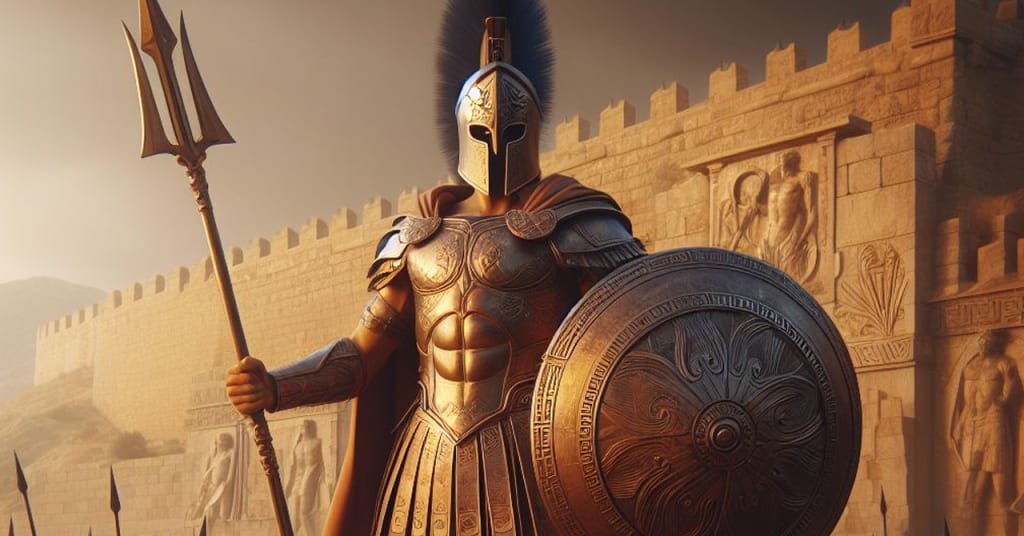
Introduction
Achilles, the unparalleled hero known for his strength and bravery, is one of the most famous figures in ancient Greek literature. His story is prominently featured in Homer's "The Iliad," where he plays a central role in the events of the Trojan War. In this detailed account, we will explore the life of Achilles, from his birth to his death, and delve into the different facets of his legendary character.
Birth and Early Life of Achilles
Achilles was born to Thetis, a beautiful sea nymph, and Peleus, the mortal king of the Myrmidons. Thetis received a prophecy that her son would become the greatest warrior but would die young. Determined to protect him from this fate, Thetis took Achilles to the River Styx, whose waters were believed to grant immortality. She immersed him in the river while holding him by the heel, the only part of his body not touched by the water, making it his sole vulnerable spot.
Achilles was raised under the care of his parents. When he reached adolescence, Peleus sent him to be trained by the wise centaur Chiron, who taught him various skills, including combat, hunting, medicine, and the arts. Under Chiron’s tutelage, Achilles became an unmatched warrior, equipped with the knowledge and abilities that would make him nearly invincible.
The Outbreak of the Trojan War
The Trojan War began with a dispute among the gods and mortals over Helen, the most beautiful woman in the world and wife of Menelaus, king of Sparta. Helen was abducted by Paris, prince of Troy, sparking a massive conflict between the Greeks and the Trojans. To avoid the prophecy of his premature death, Achilles’ mother tried to hide him by sending him to the court of King Lycomedes on the island of Scyros, where he disguised himself as a girl. However, Odysseus, the cunning hero, discovered Achilles and persuaded him to join the Greek army.
Achilles and the War
In Troy, Achilles quickly proved himself as the greatest of warriors. He was incredibly fast and powerful, leading the Myrmidons with unparalleled valor. He wielded armor and a sword crafted by the god Hephaestus, adding to his legendary prowess. Despite his strength, Achilles possessed a complex personality marked by intense anger and pride.
The Quarrel with Agamemnon
Achilles and Agamemnon, the commander of the Greek forces, were often at odds. Their conflict reached its peak when Agamemnon took Briseis, Achilles' concubine, as compensation after he was forced to return his own concubine, Chryseis, to appease the gods. This action infuriated Achilles, who vowed not to fight under Agamemnon's command and withdrew to his tent, causing a significant crisis among the Greek ranks.
The Death of Patroclus
With Achilles absent from the battlefield, the Greeks suffered severe losses. Patroclus, Achilles’ closest friend, tried to persuade him to return, but Achilles refused. Instead, he allowed Patroclus to wear his armor and lead the Myrmidons into battle. This decision proved fatal, as Hector, the great Trojan prince, killed Patroclus, believing him to be Achilles. The death of Patroclus ignited a fierce rage in Achilles, driving him to return to the battlefield for vengeance.
Achilles' Return to Battle
Achilles' grief and fury over Patroclus' death knew no bounds. He donned new armor made by Hephaestus and reentered the battlefield with a singular focus on avenging his friend. He challenged Hector to a duel and killed him with a deadly strike. In a display of vengeful wrath, he dragged Hector's body around the walls of Troy, inciting the anger of the gods. Ultimately, the gods convinced Achilles to return Hector’s body to his father, Priam, for a proper burial.
The Death of Achilles
Despite his triumphant return and victories in battle, Achilles’ end was near. According to legend, he was killed by an arrow shot by Paris, guided by Apollo, the god of the sun. The arrow struck his heel, the only vulnerable part of his body, leading to his death. His demise was a great loss for the Greeks, but it also fulfilled the prophecy of his early death.
Legacy
Achilles left a tremendous legacy in literature and mythology. He became a symbol of courage, strength, and heroism, but also an example of human frailty and destructive anger. His story teaches us that even the greatest heroes have weaknesses and that anger and pride can have dire consequences.
Analysis and Reflections
The story of Achilles is rich with meanings and lessons. His character embodies the human contradictions between strength and vulnerability, bravery and recklessness, love and rage. His short, eventful life represents the pinnacle of Greek tragedy, where human strength intertwines with divine intervention, creating deep and complex drama.
In Greek literature, Achilles represents the ideal heroic figure, possessing extraordinary strength and beauty, yet harboring deep, complex emotions. His story also teaches us about the concept of honor in warfare and how friendship and loyalty can be powerful motivators. His conflict with Agamemnon also reflects the political and military aspects of war, showing how personal disputes can significantly influence events.
Conclusion
The story of Achilles remains one of the most influential and inspiring tales in world literature. His life and battles, his personal struggles, and his complex character illustrate the power of Greek mythology to convey deep lessons about human nature. Across generations, Achilles continues to be a symbol of bravery and strength, exemplifying how love, friendship, and rage can shape human destiny.
About the Creator
nader Asaad
Sound engineer, music arranger, and lover of writing short stories
Enjoyed the story? Support the Creator.
Subscribe for free to receive all their stories in your feed. You could also pledge your support or give them a one-off tip, letting them know you appreciate their work.






Comments (1)
Loved your work.